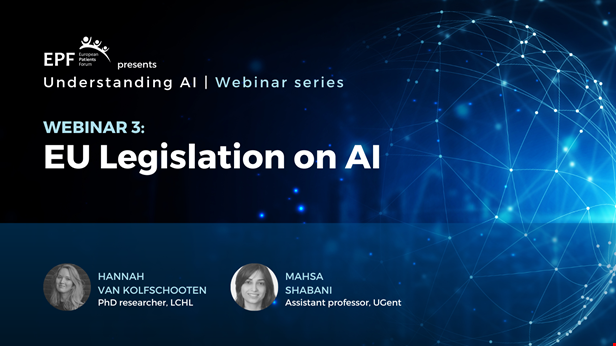EU Legislation ON AI

Understanding AI webinar series: #3 EU Legislation on AI
On the 28th of October, the European Patients’ Forum (EPF) organised the third webinar of the ‘Understanding AI’ series.
The event focused on the topic of EU legislation on Artificial Intelligence (AI). The introduction to the webinar was delivered by Kaisa Immonen, EPF Director of Policy, who briefly showcased previous EPF work on AI, but also our ongoing activities on the topic.
The two invited speakers took the floor afterwards: Mahsa Shabani (Assistant Professor – Ghent University) and Hannah van Kolfschooten (PhD Researcher & Lecturer – University of Amsterdam).
Hannah van Kolfschooten set the stage and brought forth the challenges for patients’ rights that derive from the new Artificial Intelligence Act. Her presentation started by reviewing what health-related AI is and moved forward to discuss the legal challenges that derive from AI use in healthcare, such as liability, digital literacy, and bias in data. Consequently, these challenges directly reflect, according to Hannah van Kolfschooten, in patients’ rights. Considering these observations, the presentation touched upon the Artificial Intelligence Act, while reflecting on the fact that the regulation is a general product regulation, with limited EU power in the field of healthcare. Hannah van Kolfschooten concluded her intervention by inviting the audience to reflect on the consequences the AI act entails for patients.
Mahsa Shabani (Assistant Professor – Ghent University) followed and spoke about the right to information of patients in algorithmic healthcare, from GDPR to the European Health Data Space. In the context of EHDS, Mahsa Shabani started off by giving a brief overview on the types of health data included in the legislative proposal. Considering the complexity of the legislative proposal, she then highlighted some shortcomings of the regulation: discrepancies between member states, unclear specifications about secondary use of data, and unclear legal base (i.e., consent versus public good). The second part of the presentation focused on the secondary use of data and the legal bases for its use, concluding that transparency from all stakeholders is crucial in driving the successful implementation of the regulation.
The Q&A session that followed their presentations further explored the pros and cons of AI use in healthcare, voicing out patient-centric implications: health data governance, patient rights protection at national level, informed consent, and the wider societal impact. The discussion also touched upon potential negative aspects of AI use, such as biased tools, unequal access (both in terms of data sharing and health literacy), and vulnerable populations.
Kaisa Immonen concluded the webinar by thanking the two guests and sharing preliminary information about the upcoming webinars:
- AI in Medicine Innovation (18 November 2022)
- Patients, Healthcare Professionals & AI (TBA)
The ‘Understanding AI’ webinar series aims to present complex technical content in an understandable and engaging way to equip the European patient community with the necessary know how to shape and present the patient perspective on the new and increasingly important AI policy topics that are becoming an important field of policy discussions both at European and national level. Watch the recording of the webinar here.
This project has been supported by the European AI Fund, a collaborative initiative of the Network of European Foundations (NEF). The sole responsibility for the project lies with the organiser(s) and the content may not necessarily reflect the positions of European AI Fund, NEF or European AI Fund’s Partner Foundations’.
